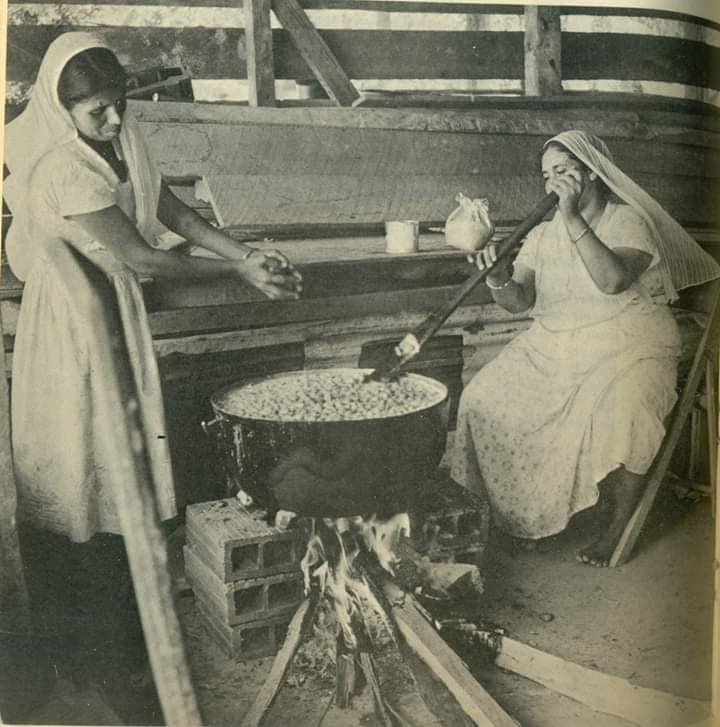|
By: Attorney Melissa D. Goolsarran Ramnauth (Fort Lauderdale)
West Indian history dates back to the beginning of human civilization (as one of the three cradles of civilization was Southern India). However, its documented history is sparse and lacking. The primary reason is that the West Indians were not afforded an opportunity to record their history and experiences during their plight as indentured servants and colonial subjects. West Indian history obviously begins in India. India’s rich history dates back 30,000 years. Around 4,500 BCE, the Indus Valley emerged with the first urban culture in South Asia. The Indus Valley civilization then declined because of a lack of monsoons. The Indian continent would later go on to flourish. Emperors and kings reigned over distinct regions. Nevertheless, there was still a sense of belonging to the motherland. With time, the Indian culture began to share certain commonalities. For example, devotional hymns in the Tamil language were widely imitated. This would later develop into the current Indian languages. In the 16th century, the Mughal Empire ruled. The emperors were direct descendants of the infamous Ghengis Khan. They did not impose Islam and the locals were free to continue their native practices. The relatively peaceful empire allowed the arts to flourish with a mix of Persian and Indian aspects. Modern India began when the British defeated the Mughals and ended the golden age of art and co-existence. One benefit was that the British presented India with a map. The map helped to alter the Indians’ perception of themselves from competing subgroups to a unified continent. However, the poverty rate during the British’s colonization contributed to Indians seeking employment under the indentured servitude system. Some Indians accepted the job offer to work overseas for 5 years and then return home to India. Others were deceived and thought that they were only going to work in another part of India. They were placed in crowded holding areas and then faced 3 tough months at sea (or the kala pani) en route to the Caribbean. The Indians ate rationed food and shared communal spaces. The ship’s docking was probably welcomed by the Indians to end the difficult and isolating conditions on board. The Indians were eventually taken to their assigned plantations, which included communal barracks. They were forced into hard labour cultivating sugar, cocoa, and rice in exchange for low wages. Moreover, like slavery, indentured servitude was condemned for its oppressive, violent, unhealthy, and depressing nature. From 1834 to 1917, Britain transported approximately 2 million Indians to 19 colonies around the world. Many Indians never made it back to India. This was either because the British deemed it too expensive to transport them to India as previously promised, and/or the Indians decided to stay and begin a new life with the land they were granted. The Indians who ended up staying in Trinidad and Guyana often continued the grueling labor associated with the agricultural trades. Britain initially refused to provide equal schooling. As a result, employment opportunities were limited for the “West Indians,” as they became known. Some West Indians had to take jobs in towns and villages far from home. Education and other resources improved slightly, but many West Indians felt that there were better opportunities in the United States, Canada, and Europe. This caused a surge in emigration. Once again, many of the Indians (turned West Indians) had to leave their parents, families, friends, and life as they knew it in order to attempt to secure a more promising future. The continued hardships and displacement of the Indians who left India, to the workers in the Caribbean, and to the recent generations who left for northern countries explain the lack of thorough and diverse history sources. There were either no opportunities or rare opportunities to document history while traveling across the Atlantic, working in the fields, or relocating to a foreign area. Thankfully, younger generations are more likely to enjoy their parents and grandparents without the imminent threat of relocation for better opportunities. The undersigned therefore hopes to use this status to expand the field of West Indian history to highlight the value of the West Indians, especially when international investors are vying for Trinidad and Guyana’s natural resources. Source: MGDR Law. Melissa D. Goolsarran Ramnauth, Esq. is a business attorney. She graduated magna cum laude from the University of Miami with a Bachelor of Arts degree in Political Science, a minor degree in History that focused on the slavery and indentured servitude eras, a minor degree in Criminology, and a Juris Doctor degree. MDGR Law, P.A. PO Box 101794 Fort Lauderdale, FL 33310-1794 (305) 684-3647 [email protected] www.mdgrlaw.com
0 Comments
 The black and white photos are of women of East Indian descent preparing food for some special occasion in the 1950s There is no immigrant story that comes without some painful recollections. It is a testimony however to the spirit of ALL Trinbagonians, that we have managed to grow beyond recriminations and become a more unified people despite the will of divisive elements such as politicians and pseudo-religious leaders. It seems odd now in a society that counts doubles as a staple food, and where roti has almost epicurean status in some places, that the derision of the Indo-Trinidadians and their food was once commonplace. One of the first articles I wrote for this newspaper back in 2012, was on the roots of Indo-Trinidadian gastronomy which is anchored firmly in the rations which the labourers received during their contracted residences on the sugar plantations of the island. Though the provisions were sometimes augmented or differed according to the estate, the general issue was as Charles Kingsley described it in 1870: “Till the last two years the new comers received their wages entirely in money. But it was found better to give them for the first year (and now for the two first years) part payment in daily rations : a pound of rice, 4 oz. of dholl, a kind of pea, an oz. of coco-nut oil, or ghee, and 2 oz. of sugar to each adult ; and half the same to each child between five and ten years old.” The variations would usually be the addition of a small quantity of saltfish, dried pepper or potatoes. Eked out by provision gardens, often planted with crops brought from India as seeds in the ‘jahaji’ bundles of the labourers, it laid the foundation of a spicy food culture which is as different from anything produced in India today. Those who have dined on authentic Indian dishes will attest to the immense difference from the deliciously creolized creations of Trinidad. Diversification of the Indo-Trinidadian palate came about in the 1880s when many shopkeepers realized what was necessary to attract a clientele from this ethnic group. Wholesalers began to import a variety of spices and curry ground with a ‘sil and loorha’ became more commonplace. Large quantities of ghee, channa (chickpeas). Essentials like mustard oil began to make their appearance at both rural and urban grocers. Nevertheless, Indo-Trinidadian cooking remained an ‘underground’ scene, unknown to most other ethnic groups and rarely tasted outside of the mud huts where it was prepared unless one was invited as a guest. Tempting talkarees, rotis and meetai (sweets) churned out in the aromatic smoke of an earthen chulha (fireplace) were a well-kept secret, not by dint of cultural isolation alone, but also because of a growing sense of shame and self-loathing. Indo-Trinidadian children who attended government schools or schools operated by denominations other than the Canadian Presbyterian Mission to the Indians (CMI) were ridiculed for the lunches they carried, usually sada roti and some sort of bhagi or talkaree. It inculcated a massive inferiority complex which many carried into adulthood. This is well-remembered by persons today and finds its way into Caribbean literature such as the works of Sir V.S Naipaul and Ismith Khan. Well through the 1930s, Indo-Trinidadian concoctions was looked down upon as ‘hog food’ or fit only for the poorest classes. In a calypso sung by the Roaring Lion, he noted the cheapness of the diet by the chorus: “Though depression is in Trinidad, maintaining a wife isn’t very hard, Well you need no ham nor biscuit or bread for there are ways they can be easily fed, like the coolies on bargee, pelauri dhal-bat and dhal-pouri , channa, paratha and the aloo-ke-talkaree” Even doubles at its genesis in the hands of Enamool Deen in Princes Town was viewed as lowly stuff, unfit for consumption by all but rumshop drunks and hungry schoolchildren. In a memoir written by his son, Badru Deen, the struggle to introduce doubles to the urban consumer in San Juan and Port of Spain is well documented. It would be many decades before Trinidad’s most celebrated street food found a place in the national palate. As a fast food, roti was almost non-existent in the towns like Port-of-Spain where it only began to appear in the 1940s during World War II. Roadside roti-stalls were set up with all the necessary utensils, including several coal-pots, churning out dhalpouri with fillings of curried beef (ironic and at once immensely popular), goat, and curried aloo. Chicken a more expensive option. Some rumshops owned by Indians served roti as well. It is a long and stony road that Indo-Trinidadian cuisine has travelled to gain the universal acceptance it enjoys today. Source: Virtual Museum of Trinidad & Tobago, Nov. 13, 2020.  To add to his long list of accolades, Slinger “Mighty Sparrow” Francisco will now be immortalised at the Caribbean Wax Museum in Norman Centre, Bridgetown, Barbados. The life-like depiction of the ‘Jean and Dinah’ singer will be unveiled tomorrow on the premises of The Commercial Credit Division of Consolidated Finance Co. Ltd, Barbados. The unveiling is a merged effort of the Trinidad and Tobago Association of Barbados, Corporate & Commercial Credit Division of Consolidated Finance Co. Ltd and the Caribbean Wax Museum. The Grenadian-born Francisco gained the title “Calypso King” of the world through his music. Since 1956, he has remained the only calypsonian to have won the T&T Calypso Monarch title more than anyone else—eight times. He also took the Road March title on several occasions. Fransisco also took his music to the US, Europe and even Africa. For his contribution to the cultural and musical landscape of T&T and taking the art form to the world, the 85-year-old was bestowed several honours, including an honorary doctorate from the University of the West Indies in 1987, the honourary title of Chief of the Yorubas, Chaconia Gold Medal, Order of the Republic of T&T and the Order of the British Empire (OBE). Of this latest honour, Francisco yesterday told Guardian Media it was a very nice thing for the Caribbean Wax Museum to honour him in such a way. He said he was made aware of this five months ago and had no objection to it. “I have been doing my thing for a very long time. It is good to see this…I wish I could be there to see it,” he said through laughter via a telephone conversation from his US-based home. Asked whether more needed to be done in T&T honour its creatives, Francisco answered, “I think we should continue doing these things.” Meanwhile, Trinbago Unified Calypsonian Organisation (TUCO) president Lutalo “Brother” Resistance” Masimba labelled the unveiling as “timely.” Masimba said given that the honour has come during the celebration of Calypso History Month adds a certain “quality” to the celebration and fitted in nicely with its theme—Calypso Beyond Boundaries and Borders. He said TUCO was very pleased with the recognition of one of the Caribbean’s greatest calypsonians of all times. In an email interview, directors at the Caribbean Wax Museum said, “As with everywhere else in the world where Caribbean people have settled, the Mighty Sparrow set the standard against which all calypsonians are judged. Barbados’s Mighty Gabby is in many ways a protegee.” The wax figure of Fransico will join other regional artistes in the soca arena like Barbados’ Alison Hinds and Lil Rick, Barbadian-born US-based R&B singer Rihanna, as well as historical revolutionaries like Che Guevera and Fidel Castro. Source: T&T Guardian, Oct 30, 2020  Neerja Bhanot was the Senior Flight attendant on the infamous Pan Am Flight 73 of 1986. The plane was scheduled to fly from Mumbai to the United States. Before takeoff four hijackers boarded the plane at Karachi airport in Pakistan and held 380 passengers and 13 crew members hostage at gun point in a 17 hour stand off. When the hijackers demanded the passports of the Americans on board to take those passengers as collateral for a trade Bhanot hid the passports under seat cushions, flushed them down the toilet and threw them down the trash shoot. Unable to decipher the American passengers from non-American passengers the situation escalated as the hijackers began shooting and detonating explosives. Bhanot deployed the emergency escape doors and began frantically guiding passengers out of the plane. One of the last to remain, a hijacker grabbed her by her ponytail and shot her point blank while she was shielding three American children from gun fire. She died at 22 the day before her birthday. She saved the majority of the passengers and the flight crew. Source: Trinbago Golden Memories, Oct 18, 2020 Patrick S. Castagne composed the words and music of the National Anthem in 1962. The words of the National Anthem reflect the nature and the strength of the people of Trinidad and Tobago, our courage as one nation working toward living in unity despite our diversity.
Forged from the love of liberty, In the fires of hope and prayer, With boundless faith in our Destiny, We solemnly declare, Side by side we stand, Islands of the blue Caribbean Sea, This our Native Land, We pledge our lives to Thee, Here every creed and race finds an equal place, And may God bless our Nation, Here every creed and race finds an equal place, And may God bless our Nation. |
T&T news blogThe intent of this blog is to bring some news from home and other fun items. If you enjoy what you read, please leave us a comment.. Archives
June 2025
Categories
All
|





 RSS Feed
RSS Feed